Valley County
2023 MSU Extension Highlights
2023 MSU Extension Highlights
MSU Extension provides unbiased, science-based education to the residents of Valley County to improve their lives and enhance their livelihood. The Extension educators provide programming, resources, and outreach in the areas of youth development, agriculture, family and consumer sciences, natural resources, and community health and development. Carved from territorial Dawson County in 1893, Valley County boasts a population of 7,369 individuals on over 5,000 square miles. Approximately one third of the county lies within the confines of the Fort Peck Indian Reservation. The county seat, Glasgow has been identified as the official “middle of nowhere”, a source of pride for residents. Tourist highlights include the Fort Peck Summer Theater, built in the 1930’s during the construction of Fort Peck Dam; The Pioneer Museum; the Northeast Montana Children’s Museum; C.M. Russell Refuge; Fort Peck Reservoir; and the Fort Peck Interpretive Center with dinosaur displays, dam construction exhibits, and an observation beehive.
Agriculture & Natural Resources
Saving Livestock
Forage quality is critically important to the health and wellbeing of livestock in Montana. Nitrate content of certain feedstuffs can reach potentially toxic levels due to plant stress caused by factors such as drought, frost, hail, over-fertilization, and even over watering. Northeastern Montana has suffered through 3 years of drought and is predicted to have another low moisture year in 2024. The MSU Extension office in Valley County conducts free nitrate testing for producers concerned with forage grown under poor conditions. The office averages about 3 tests per week per year for a total of about 150 tests per annum. The strip test method used provides a nitrate content range rather than just a positive or negative presence. This range allows us to make management decisions for feeding rations, or further analysis if nitrates levels are suspiciously high. In 2023, several instances of cattle deaths led to an investigation of feedstuffs and water consumed that may have led to a cause of death. In two instances the nitrate levels were highly toxic in the feed, and in one cyanobacteria (blue-green algae) was the culprit. The producers were able to identify which forage was toxic and remove or reduce that feedstuff from the diet. Cattle were moved out of a pasture that had contaminated water before any more losses were experienced by the producer. This quick, easy, and free test has saved ranchers time, money, and stress, by reducing livestock losses.
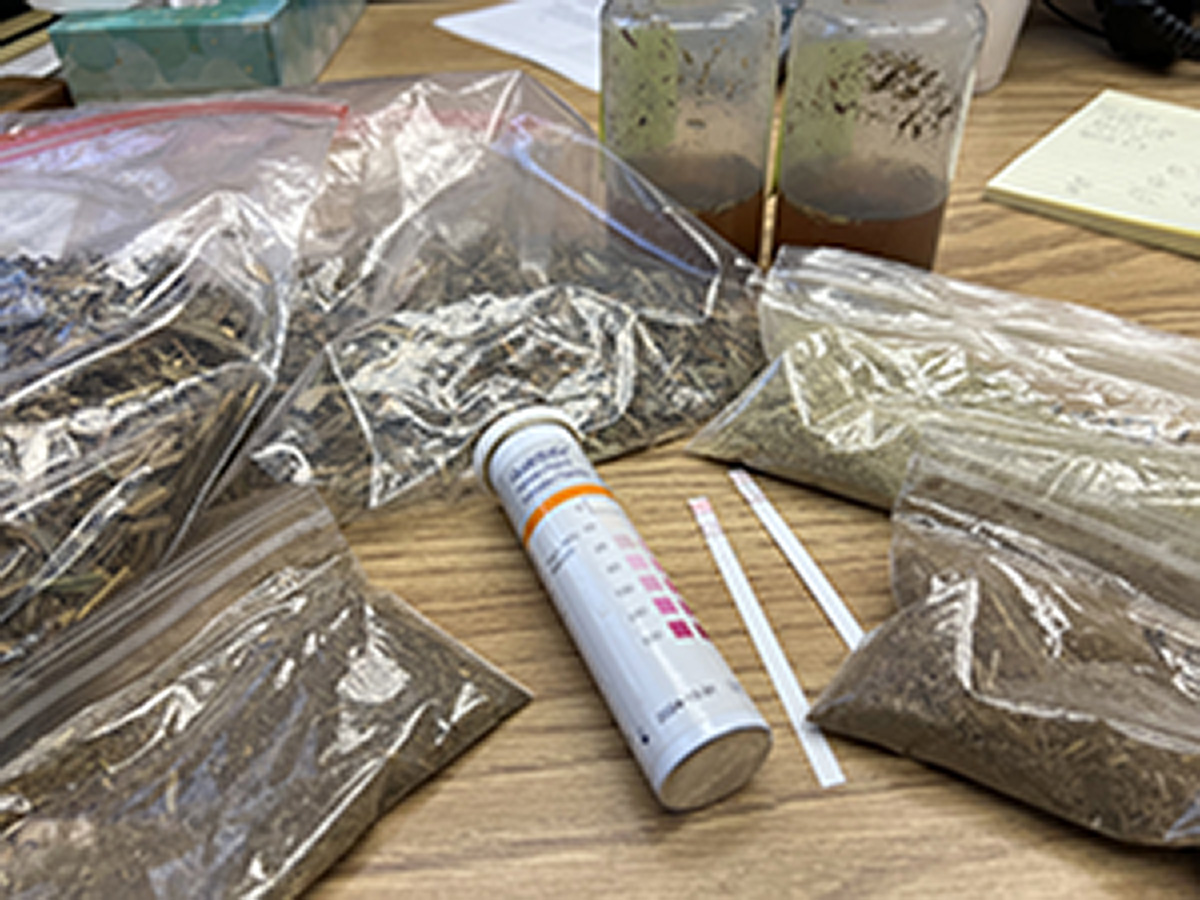
Caption: Nitrate Testing of Forages
Credit: Shelley Mills
4-H & Youth Development
Positive Youth Development
Positive youth development occurs through an intentional process that provides opportunities, choices, relationships, and the support necessary for youth to fully reach their potential. Youth gain confidence through their participation in a variety of experiences. Valley County youth development is not limited to traditional 4-H programming where members learn life skills, service to others, camp with other members and build public speaking confidence. They also practice communication, parliamentary procedure and team building in the classroom. Youth learn food safety, incubate, and raise poultry in a hands-on environment and serve their community. Youth learn citizenship, leadership, compassion, and kindness. The recent past has revealed a series of unique challenges for American leadership. Therefore, it is vital that today's young people be afforded every opportunity to become more aware of our country's heritage and its economic, political, and cultural principles. Our youth development efforts are multifaceted with incredible impacts.
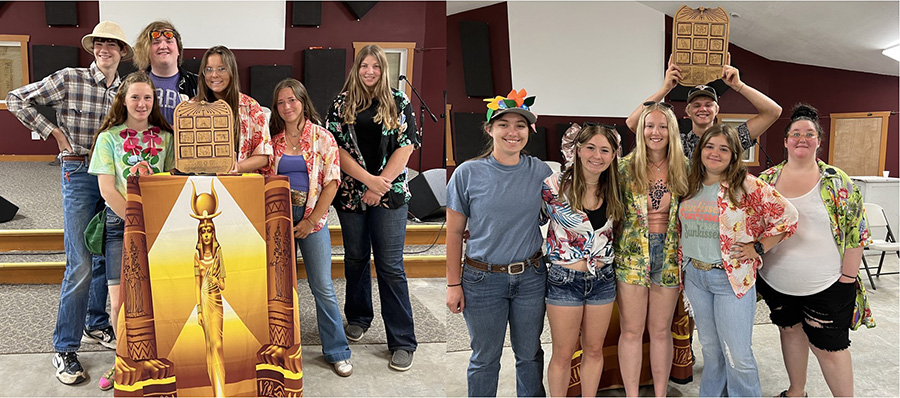
Caption: Camp Youth counselors participate in teambuilding activities prior to camp.
Credit: Roubie Younkin
Community Vitality
Teacher Workshop
Good teachers become great teachers when they go beyond the textbook to create an experiential learning environment. Because continuing education is an ongoing requirement of our state’s educators, Valley County MSU Extension Agents Shelley Mills and Roubie Younkin provide teacher training each year for local teachers. The Night at the Museum theme provided a backdrop for learning experiences such as psychological concepts that can enhance elementary and secondary teaching. Lessons also explored self-reflection based on Teddy Roosevelt’s “What Are You Made Of” and Brene’ Brown’s perspective on his “Man in the Arena” speech. An ancient artifact (tomb) Escape Room provided a modern approach to teaching and learning as educators worked together to solve clues to “escape”. Educators choose between 16 OPI renewal units or the option for 1 undergraduate or graduate credit from MSU Northern. Ideas incorporated from this learning experience increases teacher’s effectiveness in the classroom and improve the learning experience of their students.
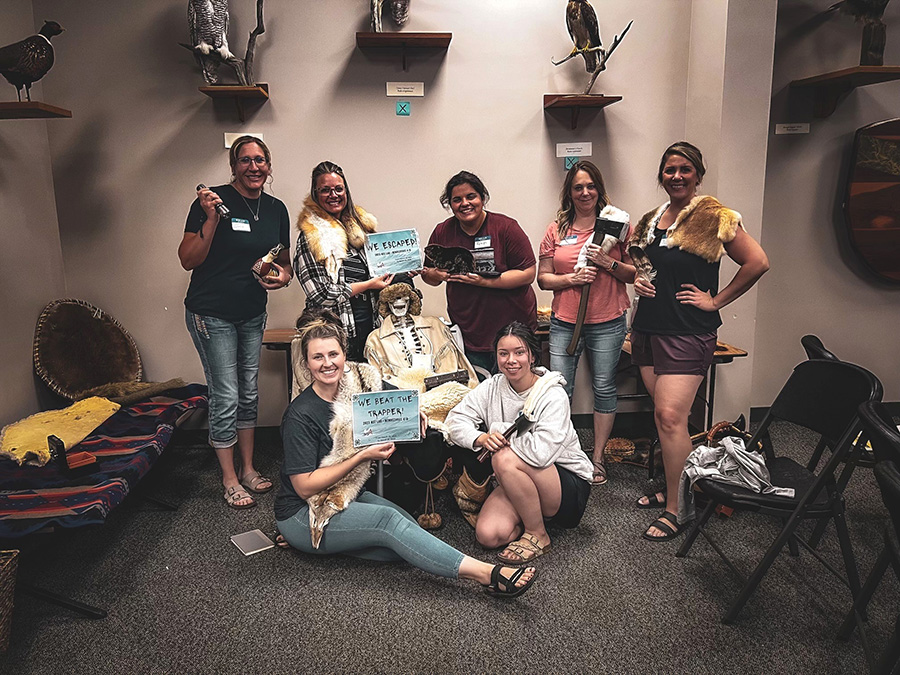
Caption: Teachers learned how to use escape rooms in their curriculum to engage students through experiential learning.
Credit: Shelley Mills
Family & Consumer Science
Grow A Row: Providing Fresh Produce to Our Community
It is a sad fact that when the food budget is stretched thin, fresh vegetables are among the first (and healthiest) items to be cut from the grocery list. Grow a Row has been an excellent opportunity to bridge community, build relationships, and provide people with access to fresh, local produce. With the start of the growing season, gardeners plan ahead to donate some of their garden produce to their local Food Bank. These donations ensure that the underserved in our community have access to high quality, fresh and/or frozen produce. In our smaller communities, timeliness is an issue because there is just one distribution day and gardens produce every day. In Valley County produce is dropped off at the Valley County Extension office to be preserved by local volunteers for future food bank distribution dates. Over 200 people are served by our local food bank.
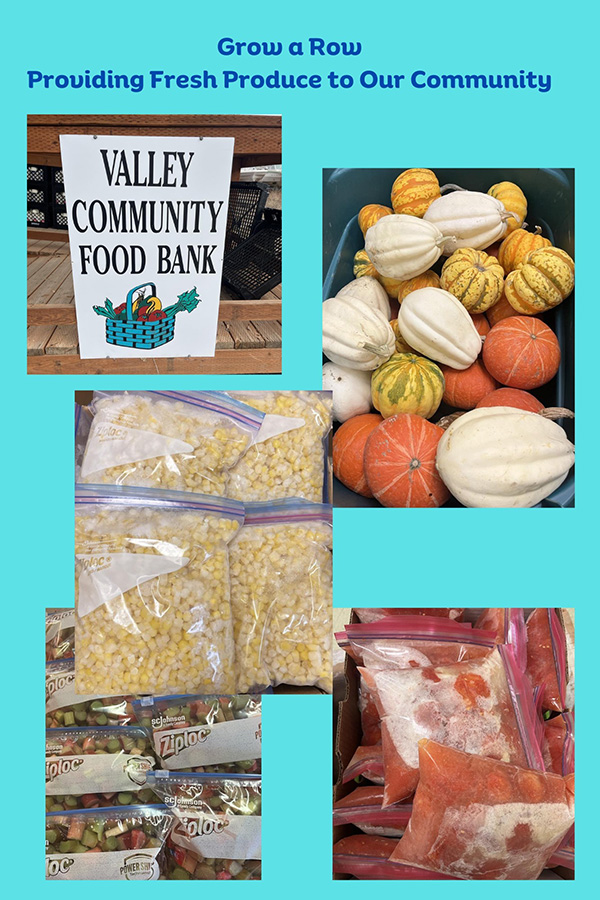
Caption: Grow-A-Row provides fresh produce to our community.
Credit: Roubie Younkin
Agriculture & Natural Resources
Pollinators and Volunteers
Valley County Extension is collaborating with the US Army Corp of Engineers (USACE) in Fort Peck, MT to place a 23-acre pollinator plot and beekeeping learning laboratory near the Fort Peck Interpretive Center. The Bee Lab is a MSU Extension project aimed at teaching hobbyist beekeepers how to manage bee hives in Montana’s climate. The six hives provide a hands-on experiential learning opportunity for novice beekeepers to become familiar with bees and beekeeping protocols. It also serves as a nursery for the observation hive in the Interpretive Center. Surrounding the bee lab is the pollinator plot project. Twenty-three acres of land has been set aside for pollinator habitat along the edge of the Missouri river. One portion of the plot will be watered using the Missouri river, while the remainder will be a xeric landscape. Habitat for pollinators as well as foraging resources are part of the plan. The project includes plans for educational signs with QR codes that lead to further investigation and understanding of pollinators and ecosystems in Montana.
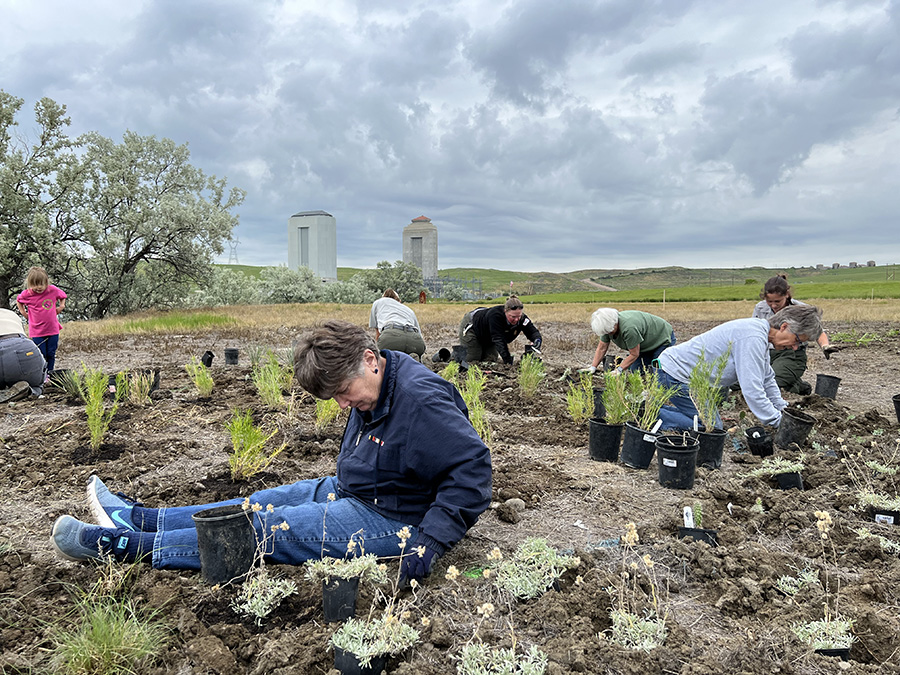
Caption: Volunteers help to plant phase two of the pollinator plot.
Credit: Shelley Mills
Contact
501 COURT SQ STE 12
Glasgow, MT 59230
406-228-6241
https://www.montana.edu/extension/valley
Montana State University Extension is an ADA/EO/AA Veteran’s Preference Employer and provider of educational outreach.

